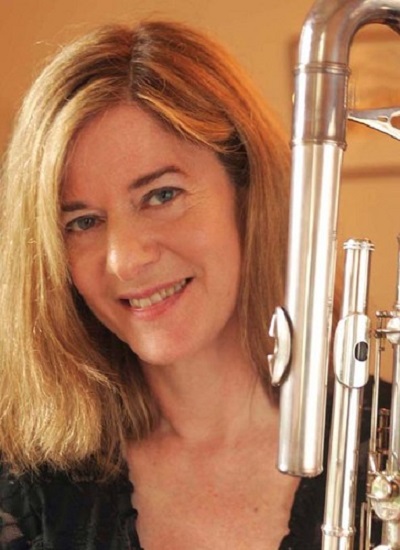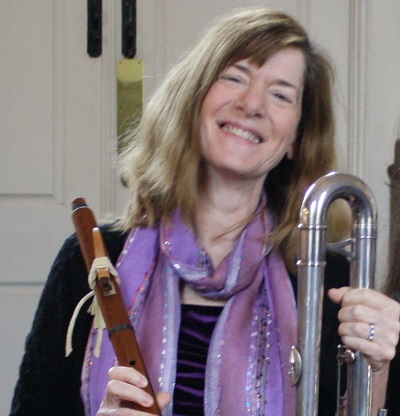
"Flute Master" Pamela Sklar Interview
www.PamelaSklar.com
Interview by Roger Zee (06/23/22)
Roger Zee: Who inspired you to pick up the flute and write songs? Do you sing or play any other instruments?
Pamela Sklar: My parents! They took me at a very young age to hear a local orchestra concert and said, "Wouldn't you like to play the flute?" I thought it looked so shiny and inviting. So I began playing the following summer at a day camp with a wonderful music director named Mr. Rose.
I also really wanted to play, and never stopped. By the time I turned eight or nine, I understood that I would become a musician. "Nature and nurture" too. I come from a very musical family. Two older, very talented brothers played from early childhood and then led their own Rock bands.
We also had some close relatives who played professionally, including a famous solo violinist cousin. But I can assure you that not one of them would've related at all to our tastes in Rock, Pop, and Soul music! Until I turned thirteen, it was all about Classical music. This might seem uncommon, but our parents wanted their kids to become musicians in life!
When I turned fourteen, the amazing, exciting bands and artists of the late 60's and early 70's wildly inspired me. This included the Beatles, Mamas & Papas, Motown, Jimi Hendrix, Aretha Franklin, Jefferson Airplane, Rolling Stones, Cream, 5th Dimension, Simon & Garfunkel, the Who, the Kinks, Lovin' Spoonful, Beach Boys/Brian Wilson, and so many others. I can't imagine how my life might have been without them!
Writing music began as a much more gradual process. I wrote a few very short tunes when in elementary school and a bit more later on. I went to the pre-college division at Manhattan School of Music during high school and worked hard with my first great private teacher there.
I studied as a performance major at Mannes College of Music, super-focused totally on playing, lessons, recitals, practice, going to concerts, auditioning, rehearsing, listening to recordings, and talking about who and what we listened to.
I didn't begin writing seriously until around 2008, a process fed by decades of listening to and playing with great players and listening to different musical styles.
I sing some backup with Intuition Quartet, but thankfully don't sing lead in either of my bands. The instruments I play, all part of a very beautiful family, include flute, alto flute, bass flute, piccolo, and Native American flute. The Western flutes and piccolo range from C below middle C to five octaves higher.
RZ: Tell me about some of the musicians and groups you gigged and recorded with.
PS: The Intuition Quartet performs group arrangements of Bossa Nova, Blues, Light Jazz, Pop, Folk-Rock, and originals. Previously, we called ourselves The Blues Mothers. We continue to play at festivals, restaurants, bars, and on some concert series, sometimes with a special theme.
I feel connected to my wonderful bandmates Hope Berkeley/harmonica/songwriter, Irene Maher/guitar/lead vocals/songwriter, Joan Indig/bass/lead vocals, and they always provide great song ideas! We have fun musically and it's also great to play without a music stand in front of me!
I also love performing in Angels in the Chamber with Garry Novikoff/keys/guitar/songwriter/lead vocals, Enid Blount Press/clarinet/bass clarinet/backup vocals, and Marc Wager/French horn/backup vocals. We co-feature Prog Rock, atmospheric, original and improvisational music, but we're closer to the Classical genre because of our training and instrumentation. We love playing together too!
These two bands excite and inspire me to collaborate in different ways! I also work in 2Flutes, a duo with Laura Falzon, a great flute colleague originally from Malta. We play a variety of early to contemporary Classical music as well as pieces written or arranged for us. All three groups each released a recording during 2018 and 2019.
I also feel very fortunate to have played a lot of chamber music with various trios and collaborated with Alan Hovhaness and Pulitzer Prize winner Karel Husa on several occasions. For almost 35 years, I played recording sessions/albums, jingles, TV, movies with members of the Metropolitan Opera Orchestra and other ensembles which included or featured Joe Lovano, Randy Brecker, Hubert Laws, Lee Musiker, Rob Mounsey, and Bob Mintzer. Bob was friends with my brother Paul in high school and recorded a very cool sax solo for a song my brother wrote back then...
Other featured artists included Tony Bennett, Lady Gaga, Paul Simon, Natalie Cole, Dave Brubeck, Elvis Costello, Andrea Bocelli, and Aretha Franklin for the Grammys, as well as eleven seasons of national and international tours as guest soloist with French crossover artist Claude Bolling, whose Suite for Flute and Jazz Piano remained at No. 1 on the Billboard chart for ten years. These exciting tours also co-featured Larry Coryell and Jack Wilkins at different times.
RZ: What instruments/amps/mics do you currently use?
PS: I play a silver 1980 Powell with a B foot -- just an extra half-step below middle C. Many concert flutes' support a lowest note of middle C. But pros usually have the B. Also a silver 1968 Haynes, C foot, which I switch headjoints on sometimes -- either a McKenna & Samperi with a gold-rimmed embouchure wall or the original Haynes headjoint which sounds great too.
My alto and bass flutes use silver heads and my Haynes piccolo was made from grenadilla wood in 1987. My Native American flutes are made from cedar. I don't own an amp or a mic.
RZ: Talk about your home studio.
PS: Except for a few gigs done with a decent computer mic attachment during 2020-21, I don't use my home to record. Pretty unexciting!
RZ: What and how do you practice?
PS: My practice routine includes long tones from Marcel Moyse (formerly the last living legacy of the French Flute School), excerpts from pieces by Dave Brubeck, Pixinguinha, Beauty and the Beast (from my Broadway subbing days), an occasional Andersen etude (Opus 15 and others), some Jazz patterns and things I'm learning at the time. My approach includes focusing on the challenging segments using different rhythms, articulation and tempos.
RZ: Do you teach music privately?
PS: I do, and enjoy working with kids!
RZ: How has the Pandemic affected you? What's on the horizon?
PS: The Pandemic presented a real mixed bag. In addition to tragically losing colleagues, many meaningful gigs got cancelled, postponed, rescheduled, and re-rescheduled. Yet I enjoyed the extra time to relax and witness blissful, true natural quiet outside. I wrote some new music and played a couple of significant, online gigs. Teaching privately online didn't feel as rewarding, and a few students just quit because they missed playing in band at school with their friends.
In addition to some gigs with my bands, upcoming original music projects include Words into Music, Part 2, for which I recently won a second award from ArtsWestchester. The performance will happen in Port Chester next year and co-feature three of us playing flute/bass fl/piccolo, oboe/English horn, and clarinet/bass clarinet. Other projects include a new piece I wrote for 2Flutes along with piano, mezzo soprano and tenor for a concert at Lincoln Center Library and elsewhere this Fall.
I'm very happy to be included on two recent recordings: as a composer for 8 Strings & a Whistle's "And Nothing Remains the Same", and as a performer for Joel Martin's amazing project Jazzical Komitas.
RZ: Describe your most special and/or unusual gig.
PS: Many of my gigs felt special with my student-kid group Pam's Pipers and fantastic tours with Claude Bolling. Several odd ones stand out, one unprintable, but here goes...
Once upon a time when I gigged a whole lot more with many small groups, I got called to play background music for a big party at Sign of the Dove on Third Avenue in Manhattan. The room held so many people, tables, and chairs that I literally could not find a place to hold up my flute! I wondered how I could hold it sideways and noticed a tiny window in the brick wall.
I jammed a chair up against the wall, pushed the window open, carefully and SLOWLY held my flute straight up in the air, and angled it skillfully up to the window and out. So my right hand, arm, and most of the flute stuck out the window! Meanwhile the cellist, violinist, and I had to cram our chairs, music stands, and instruments dangerously close to each other.
We began to play, but only for a few minutes before a waiter tripped over one of the legs of a music stand and the music went flying along with a glass and plate. When the band stopped suddenly and I angled the flute back in from the window and gingerly bent over to collect the music, the diners assumed we finished and began clapping! The flute slowly and carefully went out the window again and we resumed playing. But the waiter tripped over and over again and each time, the polite and maybe tipsy diners clapped!
RZ: How do you see the future of the music business?
PS: Although it feels more competitive than ever to book certain gigs, many opportunities still remain. Musicians will always perform live. But they need to increasingly diversify as artists. It will take a lot more savvy and the ability to keep up with newer technology.
Lower-paying gigs from club owners will likely continue as they have for almost five decades. Hopefully more royalties will come in more often for songwriters, publishers, and lyricists from many streaming platforms due to the support of organizations like the MLC/ Mechanical Licensing Collective created in 2019.
RZ: What advice do you give up-and-coming musicians?
PS: Make absolutely sure that you commit to playing at your highest level. Develop different types of skill sets. If you're not hungry enough, you'll run out of energy.
You need determination, perseverance, passion, emotional strength, belief in yourself, and the ability to endure constant hard work. Also networking, going to hear fellow musicians/busy players, meeting new people/musicians and staying in touch. The rejection factor's so large and the competition so huge.
More necessities -- marketing, creating your own opportunities, collaborating, teaching, accepting all kinds of work, networking, and a willingness to travel a lot. You will need to create a niche. If you feel hesitant about this or cannot make enough time to prioritize playing, balance it with other income-producing work that's related to music or something that you do well. It helps to act pleasant, respectful, and reliable.
RZ: Do you live with any animals?
PS: Yes, a cat -- Billie Lee, a sweet Tuxedo girl.
RZ: Anything else you'd like to add?
PS: Thank You Roger for your dedication to music and musicians! For the curious, find further info about my bands, music and recordings at PamelaSklar.com.
YouTube - "Spell 166" - Pamela Sklar
YouTube - "Native Dream" - Pamela Sklar at the Jan Hus Church, NYC April 28, 2013
©2022 Roger Zee


